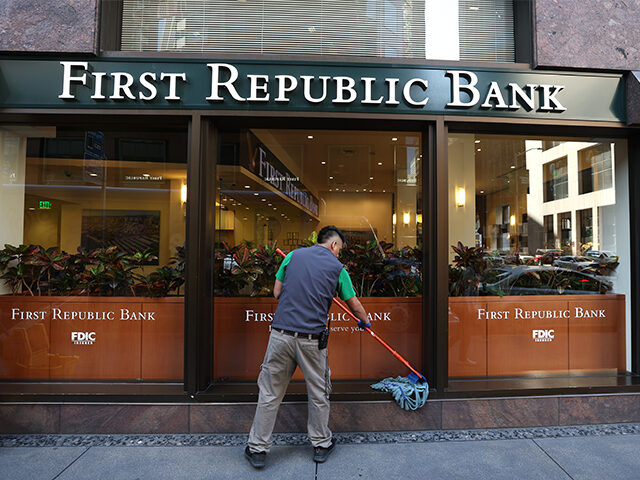First Republic won’t be the last bank to fail, Breitbart Economics Editor John Carney warned Fox Business host Larry Kudlow in an interview Monday following JPMorgan Chase’s acquisition of the failed bank.
“All of the banks that expanded their balance sheets extremely large during our zero percent era are now running into big problems,” Carney told Kudlow.
The Shark Tank’s Kevin O’Leary told Kudlow that the failure of First Republic Bank was due to “idiot banking management,” and now the shareholders of JPMorgan Chase, which agreed to assume the failed bank’s deposits and assets, are stuck “eating” this.
“The reason First Republic failed was idiot banking management, poor judgment, and what they did to their balance sheet, not because their clients welched on their loans,” O’Leary said. “The bank was managed by idiots. And so, the question I have now—and this is what everybody should be thinking about across the country—if I’m a shareholder of JPMorgan or Bank of America or any of the money center banks, am I going to be force-fed all the idiot banks? Is that going to happen to me?”
“[First Republic Bank] is of little value to me as a JPMorgan shareholder,” he continued. “It’s virtually not going to move the needle at all. It’s a pain in the rear end in terms of consolidating this. And all of this because of idiot management. Why do I have to pay for idiot management over and over and over again? That’s the hue and cry that you’re going to start hearing pretty soon. That’s why we’ve got to fix this system. Fifteen percent of those 4,500 banks are probably run by idiots. Do I have to eat them all? Or should the government eat them? Or should the shareholders eat them or the people that actually have their deposits their eat them beyond the $250,000? These crashes have not been answered, Larry, but I’m already full. I have indigestion with my shares of JP Morgan. I can’t eat any more garbage banks.”
Kudlow noted that more banks could fail because the Federal Reserve is still raising interest rates to meet its two percent inflation target.
“The Federal Reserve is not done tightening the screws on credit conditions,” Kudlow said. “They’re going to raise rates again this week. People are saying it’s one and done. I’m not sure. I mean, in fact, I don’t believe it’s one and done. I don’t think they’re going to increase their balance sheet. I think they’re going to shrink their balance sheet.”
Carney agreed and noted that the risk of more collapses remain.
“I’m sorry, Kevin. You’re going to have to eat more of this,” Carney quipped. “This is not going away at all. We’re going to have more. Yes, First Republic had problems. But it is not the only bank that is running into problems. All of the banks that expanded their balance sheets extremely large during our zero percent era are now running into big problems.”
Carney noted that First Republic Bank and Silicon Valley Bank both ran into trouble due to the Federal Reserve’s rapid pace of interest rate hikes, and other financial institutions are sure to face this same problem.
“Their funding costs are above what they’re able to raise in their interest rates,” he said. “So, they’re going to be destroyed. And it won’t end here. It’s going to be, yes, Silicon Valley Bank, now First Republic, [and] it’s going to be another one as well.”
Carney explained this in an article Saturday before the announcement that JPMorgan Chase took over First Republic’s assets:
The San Francisco-based bank was shaken by similar factors that triggered the collapse of Silicon Valley Bank. The Federal Reserve’s rapid interest rate increases hurt the value of the bank’s assets and made its funding pricier. Depositors could increasingly earn better returns on money market mutual funds that park assets with Fed facilities, an investment many see as even safer than “money in the bank.”
Republicans will be quick to chalk this up as another Bidenflation bank failure. The Fed belatedly began to raise interest rates last year after President Joe Biden’s expansive fiscal policies helped push inflation to its worst levels in four decades. This has caused significant problems for banks to grew aggressively during the low-interest rate era that preceded the pandemic and then returned when the pandemic struck.
Carney told Kudlow he was surprised that JPMorgan CEO Jamie Dimon agreed to purchase First Republic in light of the problems JPMorgan Chase encountered following its purchased Bear Stearns in 2008.
“I’m very surprised that Jamie Dimon went ahead and purchased this bank,” Carney said. “They got sued so much because of Bear Stearns and because of all the acquisitions they made in 2008. I thought they would have sat this out. I thought they would not come in at all, and they did it. I would be very wary. The stock went up on Friday, and I would be very wary if I were a shareholder of JP Morgan.”

COMMENTS
Please let us know if you're having issues with commenting.